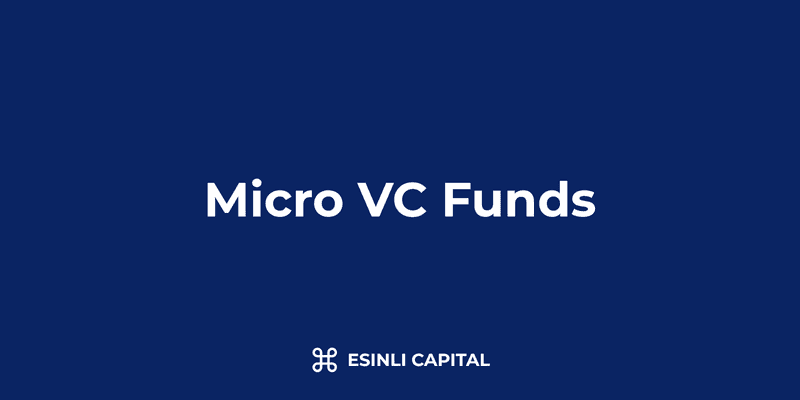
Micro VC Funds: Structure, Focus & Investment Approach
KEY TAKEAWAYS
- Micro VC funds typically invest between $25,000 to $500,000 in early-stage startups
- These funds focus on seed-stage investments and often specialize in specific industries or technologies
- Micro VCs play a crucial role in bridging the funding gap for promising early-stage entrepreneurs
- Most micro VC funds have a portfolio approach, investing in 20-50 startups per fund
- Success is measured by identifying and supporting high-potential startups before they become mainstream
What Are Micro VC Funds?
Micro VC funds are specialized investment vehicles that provide early-stage capital to emerging startups, typically investing smaller amounts of money compared to traditional venture capital firms. These funds represent a critical component of the startup ecosystem, offering crucial financial support and strategic guidance to entrepreneurs at the earliest stages of their company's development.
Unlike traditional venture capital firms that manage hundreds of millions or billions of dollars, micro VC funds typically manage funds ranging from $10 million to $50 million. Their investment strategy is characterized by smaller check sizes, hands-on involvement, and a laser-focused approach to identifying and nurturing promising early-stage companies.
How Micro VC Funds Operate
Fund Structure
A typical micro VC fund is structured similarly to larger venture capital funds:
- General Partners (GPs): Experienced investors who manage the fund, source deals, and provide strategic guidance
- Limited Partners (LPs): Investors who provide capital to the fund, including:
- High-net-worth individuals
- Family offices
- Institutional investors
- Corporate venture arms
- University endowments
Investment Strategy
Micro VC funds differentiate themselves through unique investment approaches:
- Typical Investment Size: $25,000 to $500,000 per startup
- Preferred Stage: Pre-seed and seed stages
- Investment Focus: Often specialize in specific:
- Technologies (AI, blockchain, biotech)
- Industries (healthcare, fintech, enterprise software)
- Geographic regions
- Founder demographics
Portfolio Construction
Most micro VC funds follow a strategic portfolio approach:
- Number of Investments: 20-50 startups per fund
- Diversification: Spread investments across multiple sectors
- Follow-on Strategy: Reserve capital for promising portfolio companies in future funding rounds
- High-Risk, High-Reward Model: Expecting a few investments to generate significant returns
Advantages of Micro VC Funds
For Startups
- Access to early-stage capital
- Hands-on mentorship
- Strategic networking opportunities
- Lower barrier to entry compared to traditional VC
- Specialized industry expertise
For Investors
- Potential for high returns
- Early access to innovative technologies
- Lower minimum investment compared to traditional VC
- Opportunity to support emerging entrepreneurs
Challenges and Considerations
Investment Risks
- High failure rate of early-stage startups
- Limited track record of new companies
- Significant due diligence requirements
- Longer time to liquidity
Market Dynamics
- Increasing competition for quality deal flow
- Pressure to differentiate investment thesis
- Evolving startup ecosystem
- Impact of economic cycles on early-stage funding
Emerging Trends in Micro VC
- Thematic Investing: Focusing on specific technological or social trends
- Diversity and Inclusion: Increased focus on funding underrepresented founders
- Sector Specialization: Deep expertise in niche markets
- Hybrid Funding Models: Combining venture capital with alternative funding approaches
- Global Investment Strategies: Expanding beyond traditional geographic boundaries
How to Engage with Micro VC Funds
For Startups
- Research funds aligned with your industry
- Develop a compelling pitch deck
- Build a strong network
- Demonstrate clear value proposition
- Show potential for rapid growth
For Potential Investors
- Understand the fund's investment thesis
- Evaluate the track record of general partners
- Assess portfolio diversification
- Consider minimum investment requirements
- Review historical performance of similar funds
The Future of Micro VC Funds
The micro VC landscape continues to evolve, driven by:
- Technological innovation
- Changing startup ecosystem
- Increased global connectivity
- Emergence of new investment technologies
- Growing interest in early-stage investments
Conclusion
Micro VC funds represent a dynamic and critical component of the startup funding ecosystem. By providing targeted capital, strategic support, and specialized expertise, these funds play an essential role in transforming innovative ideas into successful companies.
Frequently Asked Questions
How much do micro VC funds typically invest?
Micro VC funds typically invest between $25,000 and $500,000 in early-stage startups.
What is the difference between micro VC and traditional VC?
Micro VC funds focus on smaller investment sizes, earlier-stage companies, and often have more specialized investment theses compared to traditional venture capital firms.
How do micro VC funds make money?
Micro VC funds generate returns through:
- Successful startup exits (acquisitions or IPOs)
- Equity appreciation
- Carried interest (typically 20% of profits)
What types of startups do micro VC funds prefer?
Micro VC funds often prefer technology-driven, scalable startups with innovative solutions in sectors like:
- Software as a Service (SaaS)
- Artificial Intelligence
- Blockchain
- Fintech
- Healthcare technology
How long do micro VC funds typically exist?
Most micro VC funds have a lifecycle of 10-12 years, with active investment periods of 3-5 years.



